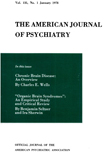Abstract
Rush in his actual writings presents himself in a manner much more illuminating for a modern physician than what is passed on by quotation from book to book and comment on comment. Woodbridge Riley's book on American Thought is still the finest presentation.
Rush treated his conception of life, the process at hand, in terms of a system of tensions and motion, which he also applied to the mental and moral faculties and their "tensions." Neither the philosophical nor the observational data were fully worked out by Rush and brought into correlation with current philosophy or science, nor did the reverse get sufficiently developed. But the fundamental actuality consists in his demanding of himself and the student the recognition of the individual's function. He demands "psychology" also for a description of its physical and chemical events as well, and sees the variations in that part of the brain in which he spoke of action and overtension of the arteries, since he was not cognizant as yet of the electric phenomena and the incidental brain potentials; but even there he did not yield to the temptation to forget the man and his specific functions in life-times and generations and relativity and a frank pluralism, and as we say today, wholes or integrates and their parts, and ergasias with their symbolizations, instead of just any kind of "psychology."
In all the passages quoted he develops an attitude about the interplay or functioning of "mental and physical" factors, without which his realism, close to one broad objectivity, cannot be done justice to. He is not, it is true, in possession of a critical "system" of philosophy, but actually a sound attitude— which a fair reader will not measure against any philosophical Cartesian pattern foreign to him as to us. He treated both "mental" and "physical" data on what we should today call a free dynamic level oriented towards life. Rush did not work in terms of materialism and mentalism, but with what we now cannot set any longer against each other, but bind together under the modern "objectivism" of a demonstrable form of life.
To him life was "dynamic" in its mind and body as unit. He avoids the misleading mistake of cutting the human problem into two fields—one for morals in the narrow practical sense, and one for physical facts in the narrow non-human sense. He lectures on "the cause of life" as the natural history and understanding and management of life. Let Rush be "philosophically" unclassified, but respected for his sense of levels of complexity.
Had Benjamin Rush had a creative successor akin to his own spirit, American psychiatry might have had the lead over the European and its actually colonial development. It took a hundred years before the step towards a culture for responsible life began to assert itself, instead of eternity—rewards based on atonement for guilt and the divine grace of sanctity harking back to an older culture. Both medicine and science shunned a frank assumption of responsibility with fairness, in keeping with a frank practice and urge for respect of objectivity, with widely varying but acknowledged limitation of capacities and all the more approximation to Carneri's modern maxim: "Nature makes her plan according to her means,"—as is done also by the wise and responsible human, i. e., the real person, in the image of his God and ideal, and in the image of sense, science, philosophy and religion. The helps, not yet in Rush's ways and habits, were the full appreciation of the wholeness of experience and respect for differences in the full sense of live religion and mutual responsibility and thoughtfulness of real life-times and life-spans and generations, rather than a heavily prejudice-charged eternity.
Our present perspective has sprung from a revival of that study of the human individual as a unit, as a person, with its fullness and dynamics, something as important as anything that this century is taking over into the next century.
This heritage to the new century would point to the faith and respect for all the sciences of man to which Rush gave expression in the language of a transition period. There were flaws of circumstance and flaws of inadequacy of the "sciences" of his day in their respect for human facts. But that he did not have a successor who might have taught as eloquently as he did the necessity of studying the whole of the individual was a misfortune. I do not know what the names and teachings of the immediate successors were. Psychiatry may see the influence of the 1840's in J. P. Gray. Unfortunately there followed various kinds of mostly "psycho-physical" parallelism, and "science" still stands in the way of giving "the mental factors" in disease and health, and life generally, a full critical, genetic-dynamic and freely pluralistic position. That is what we can say Benjamin Rush in his day had done abundantly for us. And we may hope, for the progress of the so-called physical and the so-called mental facts or referents, that we may give the coming century a useful conception of man as a pluralistic unit—with a frank appreciation of Rush as a worthy "Father of American Psychiatry."

